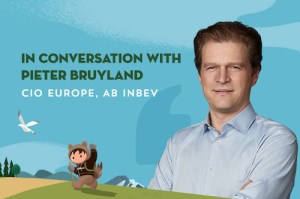In my quest to unearth more stories of what it takes to drive digital transformation at scale, I recently interviewed Pieter Bruyland, CIO Europe for AB InBev.
Pieter has always had a passion for technology, and that love for innovation has positioned him well to lead in the New Normal and beyond when agility is at a premium, analytics are key, and the old ways of working are quickly falling by the wayside. Although he started as a developer, Bruyland isn’t just fascinated by the mechanics of new digital technologies, but also by the nearly limitless possibilities they promise. His desire to unleash the maximum potential in everything has led him on a path to optimise both the technologies and the workforce as CIO Europe for AB InBev.
For him, passion is everything, optimism is contagious and the future is coming at us quickly: businesses better adapt or get out of the way. Here’s how Pieter Bruyland is helping AB InBev transform to face the future, and why he thinks innovation is a launchpad for success.
How to prepare for digital transformation at scale
Understand customer pain points
“Any solution needs to start with a problem you’re trying to solve,” says Bruyland, “We always try to start by understanding the customer’s pain points.” One of these pain points for AB InBev is last-mile delivery with customers asking for smaller batch sizes and more frequent delivery drops because they live or work in small spaces in the city.
Pieter believes there is a huge potential there and thinks it will be eased by the rollout of autonomous vehicles. But this is just one high-tech solution amongst many that he foresees coming down the pipeline to support business transformation. “Technology is moving at a pace we’ve never seen before. 5G will probably have more impact than the Internet did in the ‘90s. With augmented and virtual reality, we’re not far off from being able to enjoy a Corona on our favourite Mexican beach”.
Pieter and AB InBev have begun using algorithms to predict churn rates, build orders, and drive transport planning. They’ve adopted digital twin technologies to create replicas of several breweries, and he would like to see this used on a micro-level. “Imagine creating a digital replica of every bottle out there. I could know at what temperature it’s being consumed and where providing it is GDPR compliant.”
This focus on consumer behaviour intersects nicely with Pieter’s tech background, and he pays particular attention to the organisation’s Net Promoter Score (NPS). According to him, “NPS forces you to really understand the pain points that are driving low scores”. By exposing themselves to the outside world AB InBev can adopt a truly customer-centric approach.
Adopt an agile methodology
NPS is just one more example of how forward-thinking organisations can take advantage of the sudden data explosion to better understand their customers and optimise every aspect of their operations, from logistics and transport to marketing and customer service. It’s evident that the digital imperative has drastically reshaped the business landscape, and adopting an agile methodology is key. “Agility forces us to be product-based rather than project-based. We set up internal dev-ops teams and we built squads where we gave roles for the business and technology teams. We also started up a quarterly review of all products to assess the value we’re driving for stakeholders.”
Reskill the organisation
Pieter has put a premium on hiring workers who have a technology background, and training or re-skilling current workers who don’t. Many members of AB InBev’s workforce have been taught to code, or are being trained to earn certifications in areas that would help the company move forward. These in-house reskilling and upskilling programmes will not only help AB InBev succeed in the present but also prepare its workforce to thrive well into the future.
How to best drive execution
Unleash the full capabilities of the team
Having digital solutions in place is half the battle, but leaders will need to unleash the full capabilities of their workforce to ideate transformation. Execution at scale takes more than know-how, it requires passion and creativity. “I think as a leader we underestimate the creativity and energy that lives in an organisation. Passion trumps intelligence,” Pieter states. Capitalising on creativity and enthusiasm is vital, and when building teams, Pieter tries to stress cross-functionality, often pairing out-of-the-box thinkers with more tech-savvy employees.
Innovation can no longer be a separate function
As AB InBev and Pieter Bruyland have shown, technological know-how can be taught through training, but passion and creative thinking have to be nurtured. One key aspect for Pieter in establishing a creative, innovative mindset was in highlighting “innovation as a capability rather than a separate function”. For him, this means empowering his employees to look for forward-looking solutions to their problems, rather than searching for answers outside the company. “I ask all of my leads and managers to ideate, and to bring new and innovative product solutions to us.”
Be persistent and learn from failure
“Innovation as a capability” not only applies to the strategy adopted by AB InBev but to the potential of people, who also need to evolve and transform to reach their ceiling. And one of the key drivers of transformation is failure, which Pieter illustrates by quoting Thomas Edison’s famous words about his struggles while inventing the light bulb: “I have not failed. I’ve just found 10,000 ways that won’t work.”
It’s the knowledge gained through failure, as well as being able to walk the thin line between stubbornness and perseverance, which builds resilience. “You need to be willing to sweat through the valley of despair and pivot as needed,” Pieter says. “I think everybody has arrived at a moment where they’re the only one who believes it’s going to be all right. The light at the end of the tunnel is fading. You have more detractors than promoters. I encourage all of my team members to seek out those moments because those moments are where leaders are truly formed. Those are the moments that stay with you for the rest of your life.”
For Pieter Bruyland and AB InBev, the tunnel is far in the rear-view and the future looks bright. I’ll raise a glass to that.
To hear more from Pieter Bruyland on how AB InBev has used digital transformation at scale to prepare for the future – and how others can do the same – check out this video:
























